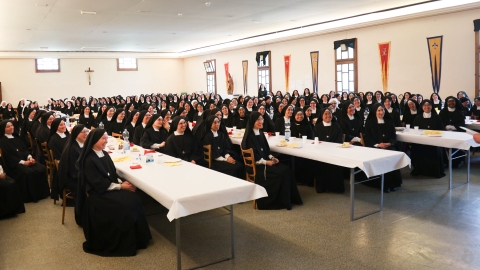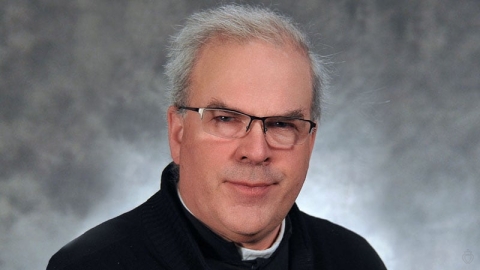The Root of the Matter

Amoris Laetitia's exaltation of individual conscience is a distant consequence of Dignitatis Humanae, but the perfectly logical one.
There are many who have denounced the disastrous consequences of last year’s Synod on the Family and the exhortation, Amoris Laetitia, which followed it. Many have shown how this document harms the family, marriage, morality, and even the Catholic understanding of the sacraments. Over the last three years, we have reported on these calls of alarm raised by cardinals and bishops, along with pro-life and faithful Catholics.
Recently, 45 theologians censured Amoris Laetitia and concluded as follows:
The propositions censured above have been condemned in many previous magisterial documents. It is urgently necessary that their condemnation be repeated by the Supreme Pontiff in a definitive and final manner and that it be authoritatively stated that Amoris Laetitia does not require any of them to be believed or considered as possibly true.”
Regrettably, few have denounced the root of the evil: the false ideas and principles that brought forth such a disastrous understanding of moral truth.
Fr. Jean-Michel Gleize, SSPX, did just that, however, in an article published in the July/August 2016 issue of Courrier de Rome. The following article is taken primarily from this source.
Who has taken notice that last year’s Synod inaugurated a reversal of the purposes of marriage and that this reversal is the foundation of the scandalous exhortation Amoris Laetitia? The pastoral guidelines that followed subvert the moral order because they place the individual conscience as the supreme judge of goodness, thus relativizing morality itself. Moreover, it leads to a denial of the moral order willed by God in nature and taught through His Church.
This subversion is nothing new, for we can already see its seed being planted in the second paragraph of Dignitatis Humanae, the Second Vatican Council’s declaration on religious liberty.
This Vatican Council declares that the human person has a right to religious freedom. This freedom means that all men are to be immune from coercion on the part of individuals or of social groups and of any human power, in such wise that no one is to be forced to act in a manner contrary to his own beliefs, whether privately or publicly, whether alone or in association with others, within due limits.”
During the very discussion about this text, Bishop Carli, one of the Council Fathers, denounced the innovative argument implicitly contained in the Council declaration. To state that religious “freedom means that all men are to be immune from coercion on the part of individuals or of social groups and of any human power,” it is to affirm that man would possesses a real and objective right, given by God, of manifesting and propagating false religious and moral ideas, without any impediment provided he is in good faith and acting within the limits established by the civil authority to preserve public order! (For more on this topic, see Bishop Carli, Speech Pronounced During the 28th General Assembly of the Second Vatican Council, September 15, 1965, Acta, IV, I, p. 264.)
Although it is true that Dignitatis Humanae speaks of this right to be immune of coercion “within due limits,” but as Fr. Gleize notices, since these limits have never been clearly defined, the door is opened to all sorts of innovations.
By establishing in religious matters the right to immunity from coercion, the Second Vatican Council gave birth to the idea that there is a right to act in religious matters independent of any authority. This false principle thus subverts morality.
“Religious matters” also means morality precisely because religion is the very foundation of the moral order, since it directs human actions towards the One who is the principle itself of the moral order.
If no authority can intervene to prevent men from acting against God’s Law in religious matters (except, perhaps, to maintain civil order), does that not open the door to people claiming a right against coercion in all matters of morality? The Second Vatican Council imported a liberal mentality into the Church whereby coercive power—civil as well as spiritual—is negated on the grounds that the individual and his conscience stands above and beyond objective right and wrong.
At the ecclesiastical level, we can see and lament how this has worked out. Instead of holding true to the Church’s right to use her authority and power to chastise public sinners by, for instance, banning them from Holy Communion, it is now the individual communicant’s so-called right to determine whether or not he will receive the Eucharist.
Amoris Laetitia, with its exaltation of individual conscience over objective morality, is a distant consequence of Dignitatis Humanae, but the perfectly logical one.
It is legitimate to denounce today the ruins that lie ahead, but one must have above all the lucidity and the courage to fight the deep roots of this crisis. More than 30 years ago, in a public letter, Archbishop Lefebvre and Bishop de Castro Mayer wrote to Pope John Paul II to denounce “the principal errors which are at the origins of this tragic situation.”
Thousands of members of the clergy, and millions of the faithful, are living in a state of anguish and perplexity because of the 'self-destruction of the Church.' They are being thrown into confusion and disorder by the errors contained in the documents of the Second Vatican Council, the post-conciliar reforms, and especially the liturgical reforms, the false notions diffused by official documents and by the abuse of power perpetrated by the hierarchy."
The bishops further noticed the following:
The documents containing these errors cause an uneasiness and a disarray, so much the more profound as they come from a source so much the more elevated."
Their letter was not only a manifesto, but a pressing appeal and cry of alarm to the Pope.
Most Holy Father, it is urgently necessary that this disarray come to an end because the flock is dispersing and the abandoned sheep are following mercenaries. We beseech you, for the good of the Catholic Faith and for the salvation of souls, to reaffirm the truths, contrary to these errors, truths which have been taught for twenty centuries in the Church."
"Thus it is with the purpose of coming to the aid of Your Holiness that we utter this cry of alarm, rendered all the more urgent by the errors, not to say the heresies[.]”





